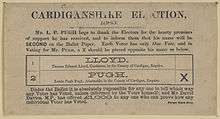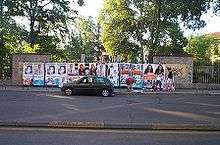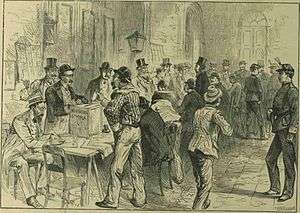Election
| Part of the Politics series | ||||
| Elections | ||||
|---|---|---|---|---|
| Basic types | ||||
| Terminology | ||||
|
|
||||
| Subseries | ||||
| Lists | ||||
|
||||
| Related | ||||
| Politics portal | ||||
An election is a formal decision-making process by which a population chooses an individual to hold public office.[1] Elections have been the usual mechanism by which modern representative democracy has operated since the 17th century.[1] Elections may fill offices in the legislature, sometimes in the executive and judiciary, and for regional and local government. This process is also used in many other private and business organizations, from clubs to voluntary associations and corporations.[2]
The universal use of elections as a tool for selecting representatives in modern representative democracies is in contrast with the practice in the democratic archetype, ancient Athens, where the Elections were considered an oligarchic institution and most political offices were filled using sortition, also known as allotment, by which officeholders were chosen by lot.[3]
Electoral reform describes the process of introducing fair electoral systems where they are not in place, or improving the fairness or effectiveness of existing systems. Psephology is the study of results and other statistics relating to elections (especially with a view to predicting future results).
To elect means "to choose or make a decision", and so sometimes other forms of ballot such as referendums are referred to as elections, especially in the United States.
History


Elections were used as early in history as ancient Greece and ancient Rome, and throughout the Medieval period to select rulers such as the Holy Roman Emperor and the Pope.[1]
In Vedic period of India, the raja (chiefs) of a gana (a tribal organization) was apparently elected by the gana. The raja belonged to the noble Kshatriya varna (warrior class), and was typically a son of the previous raja. However, the gana members had the final say in his elections.[4] The Pala king Gopala (ruled c. 750s–770s CE) in early medieval Bengal was elected by a group of feudal chieftains. Such elections were quite common in contemporary societies of the region.[5][6] In Chola Empire, around 920 CE, in Uthiramerur (in present-day Tamil Nadu), palm leaves were used for selecting the village committee members. The leaves, with candidate names written on them, were put inside a mud pot. To select the committee members, a young boy was asked to take out as many leaves as the number of positions available. This was known as the Kudavolai system.[7][8]
Ancient Arabs also used election to choose their caliph, Uthman and Ali, in the early medieval Rashidun Caliphate.[9]
The modern "election", which consists of public elections of government officials, didn't emerge until the beginning of the 17th century when the idea of representative government took hold in North America and Europe.[1]
Questions of suffrage, especially suffrage for minority groups, have dominated the history of elections. Males, the dominate cultural group in North America and Europe, often dominated the electorate and continue to do so in many countries.[1] Early elections in countries such as the United Kingdom and the United States were dominated by landed or ruling class males.[1] However, by 1920 all Western European and North American democracies had universal adult male suffrage (except Switzerland) and many countries began to consider women's suffrage.[1] Despite legally mandated universal suffrage for adult males, political barriers were sometimes erected to prevent fair access to elections (See Civil Rights movement).[1]
Characteristics
Suffrage
The question of who may vote is a central issue in elections. The electorate does not generally include the entire population; for example, many countries prohibit those judged mentally incompetent from voting, and all jurisdictions require a minimum age for voting. In Australia Aboriginal people were not given the right to vote until 1962 (see 1967 referendum entry) and in 2010 the federal government removed the rights of prisoners to vote (a large proportion of which are Aboriginal Australians).
Suffrage is typically only for citizens of the country, though further limits may be imposed. However, in the European Union, one can vote in municipal elections if one lives in the municipality and is an EU citizen; the nationality of the country of residence is not required.

In some countries, voting is required by law; if an eligible voter does not cast a vote, he or she may be subject to punitive measures such as a fine.
Nomination
A representative democracy requires a procedure to govern nomination for political office. In many cases, nomination for office is mediated through preselection processes in organized political parties.[10]
Non-partisan systems tend to differ from partisan systems as concerns nominations. In a direct democracy, one type of non-partisan democracy, any eligible person can be nominated. In some non-partisan representative systems no nominations (or campaigning, electioneering, etc.) take place at all, with voters free to choose any person at the time of voting—with some possible exceptions such as through a minimum age requirement—in the jurisdiction. In such cases, it is not required (or even possible) that the members of the electorate be familiar with all of the eligible persons, though such systems may involve indirect elections at larger geographic levels to ensure that some first-hand familiarity among potential electees can exist at these levels (i.e., among the elected delegates).
As far as partisan systems, in some countries, only members of a particular political party can be nominated. Or, any eligible person can be nominated through a petition; thus allowing him or her to be listed.
Electoral systems

Electoral systems are the detailed constitutional arrangements and voting systems that convert the vote into a political decision. The first step is to tally the votes, for which various vote counting systems and ballot types are used. Voting systems then determine the result on the basis of the tally. Most systems can be categorized as either proportional or majoritarian. Among the former are party-list proportional representation and additional member system. Among the latter are First Past the Post (FPP) (relative majority) and absolute majority. Many countries have growing electoral reform movements, which advocate systems such as approval voting, single transferable vote, instant runoff voting or a Condorcet method; these methods are also gaining popularity for lesser elections in some countries where more important elections still use more traditional counting methods.
While openness and accountability are usually considered cornerstones of a democratic system, the act of casting a vote and the content of a voter's ballot are usually an important exception. The secret ballot is a relatively modern development, but it is now considered crucial in most free and fair elections, as it limits the effectiveness of intimidation.
Scheduling
The nature of democracy is that elected officials are accountable to the people, and they must return to the voters at prescribed intervals to seek their mandate to continue in office. For that reason most democratic constitutions provide that elections are held at fixed regular intervals. In the United States, elections are held between every three and six years in most states, with exceptions such as the U.S. House of Representatives, which stands for election every two years. There is a variety of schedules, for example presidents: the President of Ireland is elected every seven years, the President of Russia and the President of Finland every six years, the President of France every five years, President of the United States every four years.
Pre-determined or fixed election dates have the advantage of fairness and predictability. However, they tend to greatly lengthen campaigns, and make dissolving the legislature (parliamentary system) more problematic if the date should happen to fall at time when dissolution is inconvenient (e.g. when war breaks out). Other states (e.g., the United Kingdom) only set maximum time in office, and the executive decides exactly when within that limit it will actually go to the polls. In practice, this means the government remains in power for close to its full term, and choose an election date it calculates to be in its best interests (unless something special happens, such as a motion of no-confidence). This calculation depends on a number of variables, such as its performance in opinion polls and the size of its majority.
Election campaigns
When elections are called, politicians and their supporters attempt to influence policy by competing directly for the votes of constituents in what are called campaigns. Supporters for a campaign can be either formally organized or loosely affiliated, and frequently utilize campaign advertising. It is common for political scientists to attempt to predict elections via Political Forecasting methods.
The most expensive election campaign included US$7 billion spent on the United States presidential election, 2012 and is followed by the US$5 billion spent on the Indian general election, 2014.[11]
Difficulties with elections

In many countries with weak rule of law, the most common reason why elections do not meet international standards of being "free and fair" is interference from the incumbent government. Dictators may use the powers of the executive (police, martial law, censorship, physical implementation of the election mechanism, etc.) to remain in power despite popular opinion in favor of removal. Members of a particular faction in a legislature may use the power of the majority or supermajority (passing criminal laws, defining the electoral mechanisms including eligibility and district boundaries) to prevent the balance of power in the body from shifting to a rival faction due to an election.
Non-governmental entities can also interfere with elections, through physical force, verbal intimidation, or fraud, which can result in improper casting or counting of votes. Monitoring for and minimizing electoral fraud is also an ongoing task in countries with strong traditions of free and fair elections. Problems that prevent an election from being "free and fair" take various forms:[12]
Lack of open political debate or an informed electorate
The electorate may be poorly informed about issues or candidates due to lack of freedom of the press, lack of objectivity in the press due to state or corporate control, and/or lack of access to news and political media. Freedom of speech may be curtailed by the state, favoring certain viewpoints or state propaganda.
Unfair rules

Gerrymandering, exclusion of opposition candidates from eligibility for office, needlessly high restrictions on who may be a candidate, like ballot access rules, and manipulating thresholds for electoral success are some of the ways the structure of an election can be changed to favor a specific faction or candidate.
Interference with campaigns
Those in power may arrest or assassinate candidates, suppress or even criminalize campaigning, close campaign headquarters, harass or beat campaign workers, or intimidate voters with violence.
Tampering with the election mechanism
This can include confusing or misleading voters about how to vote, violation of the secret ballot, ballot stuffing, tampering with voting machines, destruction of legitimately cast ballots, voter suppression, voter registration fraud, failure to validate voter residency, fraudulent tabulation of results, and use of physical force or verbal intimation at polling places.
Other examples include persuading candidates into not standing against them, such as through blackmailing, bribery, intimidation or physical violence.
See also
- Ballot access
- Criticisms of electoral politics
- Concession (politics)
- Demarchy—"Democracy without Elections"
- Electoral calendar
- Electoral integrity
- Election law
- Election litter
- Elections by country
- Electronic voting
- Fenno's paradox
- Full slate
- Garrat Elections
- Gerontocracy
- Issue voting
- Landslide election
- Meritocracy
- Multi-party system
- Nomination rules
- Party system
- Pluralism (political philosophy)
- Political science
- Polling station
- Reelection
- Slate
- Two-party system
- Voter turnout
- Voting system
References
- 1 2 3 4 5 6 7 8 "Election (political science)," Encyclpoedia Britanica Online. Retrieved 18 August 2009
- ↑ Robert, Henry M.; et al. (2011). Robert's Rules of Order Newly Revised (11th ed.). Philadelphia, PA: Da Capo Press. pp. 438–446. ISBN 978-0-306-82020-5.
- ↑ Headlam, James Wycliffe (1891). Election by Lot at Athens. p. 12.
- ↑ Eric W. Robinson (1997). The First Democracies: Early Popular Government Outside Athens. Franz Steiner Verlag. pp. 22–23. ISBN 978-3-515-06951-9.
- ↑ Nitish K. Sengupta (1 January 2011). "The Imperial Palas". Land of Two Rivers: A History of Bengal from the Mahabharata to Mujib. Penguin Books India. pp. 39–49. ISBN 978-0-14-341678-4.
- ↑ Biplab Dasgupta (1 January 2005). European Trade and Colonial Conquest. Anthem Press. pp. 341–. ISBN 978-1-84331-029-7.
- ↑ VK Agnihotri, ed. (2010). Indian History (26th ed.). Allied. pp. B–62–B–65. ISBN 978-81-8424-568-4.
- ↑ "Pre-Independence Method of Election". Tamil Nadu State Election Commission, India. Retrieved 3 November 2011.
- ↑ Encyclopedia of Islam and the Muslim World (2004), vol. 1, p. 116-123.
- ↑ Reuven Hazan, 'Candidate Selection', in Lawrence LeDuc, Richard Niemi and Pippa Norris (eds), Comparing Democracies 2, Sage Publications, London, 2002
- ↑ "India's spend on elections could challenge US record: report". NDTV.com. Retrieved 2016-02-25.
- ↑ "Free and Fair Elections". Public Sphere Project. 2008. Retrieved 8 November 2015.
Bibliography
- Arrow, Kenneth J. 1963. Social Choice and Individual Values. 2nd ed. New Haven, CT: Yale University Press.
- Benoit, Jean-Pierre and Lewis A. Kornhauser. 1994. "Social Choice in a Representative Democracy." American Political Science Review 88.1: 185–192.
- Corrado Maria, Daclon. 2004. US elections and war on terrorism – Interview with professor Massimo Teodori Analisi Difesa, n. 50
- Farquharson, Robin. 1969. A Theory of Voting. New Haven, CT: Yale University Press.
- Mueller, Dennis C. 1996. Constitutional Democracy. Oxford: Oxford University Press.
- Owen, Bernard, 2002. "Le système électoral et son effet sur la représentation parlementaire des partis: le cas européen.", LGDJ;
- Riker, William. 1980. Liberalism Against Populism: A Confrontation Between the Theory of Democracy and the Theory of Social Choice. Prospect Heights, IL: Waveland Press.
- Thompson, Dennis F. 2004. Just Elections: Creating a Fair Electoral Process in the U.S. Chicago: University of Chicago Press. ISBN 978-0226797649
- Ware, Alan. 1987. Citizens, Parties and the State. Princeton: Princeton University Press.
External links
| Look up election in Wiktionary, the free dictionary. |
| Wikiquote has quotations related to: Election |
| Wikimedia Commons has media related to Elections. |
- PARLINE database on national parliaments. Results for all parliamentary elections since 1966
- "Psephos," archive of recent electoral data from 182 countries
- ElectionGuide.org — Worldwide Coverage of National-level Elections
- parties-and-elections.de: Database for all European elections since 1945
- ACE Electoral Knowledge Network — electoral encyclopedia and related resources from a consortium of electoral agencies and organizations.
- Angus Reid Global Monitor: Election Tracker
- IDEA's Table of Electoral Systems Worldwide
- European Election Law Association (Eurela)
- List of Local Elected Offices in the United States
- Caltech/ MIT Voting Technology Project